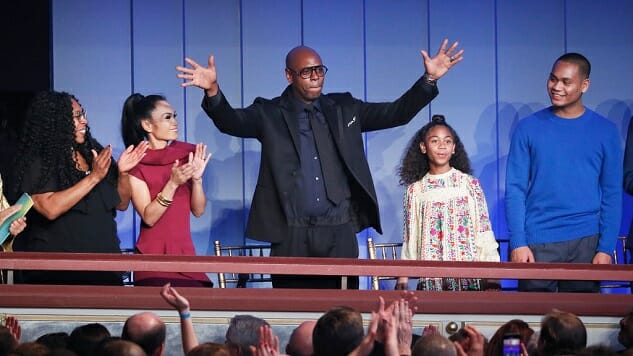Dave Chappelle and the Mark Twain Prize: Critical Thinking Is His Art
The long-awaited telecast of the October, 2019 ceremony celebrates Chappelle’s irreverence while also showcasing his D.C. roots.
Photo courtesy of Getty Images
“I’m very surprised to get this award this young, but I promise you—I deserve it.” — Dave Chappelle, DC Improv
John Legend’s sonorous protestations to the contrary, Dave Chappelle, 22nd winner of the Mark Twain Prize for American Humor, is as true a son of Washington, D.C. as he is of Yellow Springs, Ohio. D.C., after all, is where he spent his childhood and high school years—the latter at the prestigious Duke Ellington School for the Arts—and where, as a teenager, he launched his stand-up career.
“Chocolate City!” he exclaims to a packed DC Improv room in a clip about halfway through the telecast of the 2019 ceremony (that’s about the 34:40 mark, for those following along at home), which finally hit PBS airwaves earlier this week. “For us, nigga is a pronoun. We have very thick skin; we don’t shy away from the jokes. In fact, humor was our mode of survival. The only reason I never got my ass whooped on these streets is because niggas knew—I’m hilarious.”
Hailing from D.C. is by no means a requirement for the Prize (2018 recipient Julia Louis-Dreyfus’s own District upbringing notwithstanding), but when your black-tie ceremony takes place in Washington’s flagship performing arts center and is attended in large part by ultra-dedicated local patrons of the arts, it does make for pretty solid synergy. It also doesn’t hurt, as returning production company Done+Dusted so cannily demonstrated in the telecast that the October, 2019 ceremony turned into—splicing as they do clips of Chappelle’s friends and colleagues celebrating him on stage at the Kennedy Center with bluer bits from a more casual set he and his mostly local stand-up buddies had done at DC Improv the night before, as well as clips of him driving through his old haunts and reflecting on what it means to come home—that having a soul-deep connection to the city giving you an award can make for great television.
Of course, any night with Dave Chappelle as its focus is going to make great television, regardless of the production decisions involved in its final form. Not for nothing is one of Chappelle’s Show co-creator Neal Brennan’s central memories of their time working together on the cultishly beloved sketch series one of getting the best material by just getting out of Chappelle’s way.
“When we started the show, I knew that Dave was the funniest person I’d ever met,” Brennan says when it’s his turn in the Kennedy Center spotlight. “By the end of the show, I knew he was one of the funniest people who’d ever lived. There were times where he’d just improvise something that we’d never talked about before, maybe that we’d never even thought about before. Clayton Bigsby’s entire speeches about breathin’ the white man’s air and Will and Grace—all improvised! Tyrone Biggum’s speech to the kids about doing drugs with Mickey Mouse? Totally made up. He made it all up! Writing and directing Dave sometimes was sometimes as simple as me standing on set with my jaw hanging open like, ‘uh…cut?’”
In fact, while only a handful of comments about Chappelle’s comedy genius made it to the telecast’s final cut, throughout the evening, from guest to presenter, from the red carpet to the main stage, the basic fact of his spontaneous and unceasingly smart comedic mind was brought up again and again. From Kenan Thompson, on the red carpet: “He’s one of those real stand up comics. He’s got one of those real, working, thinking brains that will turn a tragedy into something funny, or something that everyone’s thinking but doesn’t want to say into something we can all say, because it’s been presented to us in a different kind of way.” From Eddie Murphy, in a pre-recorded clip that played between presenters. “Dave is so much smarter than everyone. [He] is maybe the most intellectual comedian ever.” From Sarah Silverman, towards the end of the telecast: “Okay, here’s the thing about Dave: Dave didn’t, like, get funny, eventually. He was always funny. And he remains at the top of his game. Why? Because he’s constantly evolving, he grows. Sometimes it’s a slightly more lateral move, but always with some kind of new perspective, you know? His critical thinking is his art.”